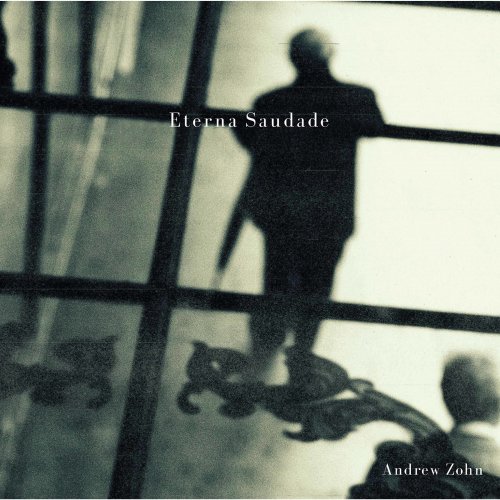
Andrew Zohn - Eterna saudade (2021)
BAND/ARTIST: Andrew Zohn
- Title: Eterna saudade
- Year Of Release: 2021
- Label: Contrastes Music Records
- Genre: Classical Guitar
- Quality: flac lossless +Booklet
- Total Time: 00:59:55
- Total Size: 244 mb
- WebSite: Album Preview
Tracklist
01. Cielo abierto
02. Milonga
03. 4 Piezas: No. 1, Mazurca
04. 4 Piezas: No. 2, Vals
05. 4 Piezas: No. 3, Trópico
06. 4 Piezas: No. 4, Rumba
07. Norteña
08. Alma apaixonada
09. Uma valsa e dois amores
10. La güeya
11. Guaranía
12. Serie americana: VII. Gato e malambo
13. Se ela perguntar
14. Eterna saudade
15. Xodó da Baiana
16. Toccata em ritmo de samba No. 1
17. Toccata em ritmo de samba No. 2
18. Con pulso
The Mexican composer Manuel María Ponce Cuéllar (1882–1948) probably wrote his Cuatro piezas para guitarra between 1932 and 1933, at the tail end of a fecund Paris sojourn in which he studied with Paul Dukas, founded the music magazine Gaceta Musical, completed Albéniz’s unfinished opera Merlin at the family’s request, and wrote many of his most lauded compositions, including much of his beloved guitar music in collaboration with Andrés Segovia. However, the Cuatro piezas were not widely disseminated together until 1992, when Schott published the Mexican guitarist Miguel Alcázar’s scrupulous renderings from the original manuscripts (which are featured on this album).
His Master’s Voice released recordings of Segovia’s heavily altered arrangements of the Valse and Mazurka in 1937. That same year—in spite of Segovia’s entreaties urging for the publication of all four compositions, presumably as a set—Schott published only the Valse. One can only speculate on the rationale for the elision of the other three pieces, but Schott became Germany’s largest music publisher during the Second World War by largely supporting the Nazi cultivation of a German music culture free of “international [Jewish, communist] tendencies.” With its delectable expressivo section, faintly redolent of the sentimental Teutonic waltzes played on so many German parlor spinets during the nineteenth and early twentieth centuries, the Valse could very well be the only piece of the four that was deemed consonant with the agenda of Goebbels’s Reichsmusikkammer.
The Mazurka is a modernist interpretation—at once impressionistic and diffusely folkish in its combinations of flamenco modality, quartal harmonies, pentatonicism, and freely chromatic touches—of a polish folk dance commonly associated with Poland’s most famous composer. And the Trópico, with its languorous habanera ostinato and sexy tritones and seconds, as well as the Rumba, with its Afro-Caribbean strumming, pay tribute ever so conspicuously to Cuba, where Ponce lived from 1915 to 1917. Whatever the reasons for Schott’s original move, the present recording would probably be wildly different had all four of Segovia’s arrangements been circulated in 1937 and, like so many Segovia reimaginings, been institutionalized as canonic in the intervening years.
01. Cielo abierto
02. Milonga
03. 4 Piezas: No. 1, Mazurca
04. 4 Piezas: No. 2, Vals
05. 4 Piezas: No. 3, Trópico
06. 4 Piezas: No. 4, Rumba
07. Norteña
08. Alma apaixonada
09. Uma valsa e dois amores
10. La güeya
11. Guaranía
12. Serie americana: VII. Gato e malambo
13. Se ela perguntar
14. Eterna saudade
15. Xodó da Baiana
16. Toccata em ritmo de samba No. 1
17. Toccata em ritmo de samba No. 2
18. Con pulso
The Mexican composer Manuel María Ponce Cuéllar (1882–1948) probably wrote his Cuatro piezas para guitarra between 1932 and 1933, at the tail end of a fecund Paris sojourn in which he studied with Paul Dukas, founded the music magazine Gaceta Musical, completed Albéniz’s unfinished opera Merlin at the family’s request, and wrote many of his most lauded compositions, including much of his beloved guitar music in collaboration with Andrés Segovia. However, the Cuatro piezas were not widely disseminated together until 1992, when Schott published the Mexican guitarist Miguel Alcázar’s scrupulous renderings from the original manuscripts (which are featured on this album).
His Master’s Voice released recordings of Segovia’s heavily altered arrangements of the Valse and Mazurka in 1937. That same year—in spite of Segovia’s entreaties urging for the publication of all four compositions, presumably as a set—Schott published only the Valse. One can only speculate on the rationale for the elision of the other three pieces, but Schott became Germany’s largest music publisher during the Second World War by largely supporting the Nazi cultivation of a German music culture free of “international [Jewish, communist] tendencies.” With its delectable expressivo section, faintly redolent of the sentimental Teutonic waltzes played on so many German parlor spinets during the nineteenth and early twentieth centuries, the Valse could very well be the only piece of the four that was deemed consonant with the agenda of Goebbels’s Reichsmusikkammer.
The Mazurka is a modernist interpretation—at once impressionistic and diffusely folkish in its combinations of flamenco modality, quartal harmonies, pentatonicism, and freely chromatic touches—of a polish folk dance commonly associated with Poland’s most famous composer. And the Trópico, with its languorous habanera ostinato and sexy tritones and seconds, as well as the Rumba, with its Afro-Caribbean strumming, pay tribute ever so conspicuously to Cuba, where Ponce lived from 1915 to 1917. Whatever the reasons for Schott’s original move, the present recording would probably be wildly different had all four of Segovia’s arrangements been circulated in 1937 and, like so many Segovia reimaginings, been institutionalized as canonic in the intervening years.
Year 2021 | Classical | FLAC / APE
As a ISRA.CLOUD's PREMIUM member you will have the following benefits:
- Unlimited high speed downloads
- Download directly without waiting time
- Unlimited parallel downloads
- Support for download accelerators
- No advertising
- Resume broken downloads


